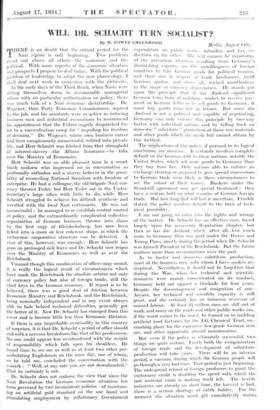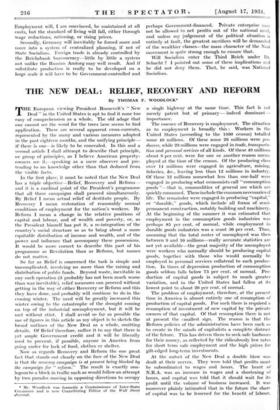WILL DR. SCHACHT TURN SOCLUIST ?
By B. POWYS
GREENWOOD
THERE is no doubt that the critical period for the Nazi regime is only beginning. Two problems stand out above all others—the economic and the political. With some aspects of the economic situation and prospects I propose to deal today. With the political problem of leadership, to adopt the new phraseology. I shall deal next week in connexion with the plebiscite.
In the early days of the Third Reich, when Nazis were sitting themselves down in innumerable managerial offices with no particular authorization or policy, there was much talk of a Nazi economic dictatorship. Dr. Wagener, then Party Economic Commissioner, aspired to the job, and his assistants were so active in inducing business men and industrial associations to recommend his appointment that the Ftihrer angrily despatched the lot to a concentration camp for "impeding his freedom of decision." Dr. Wagener, whose own business career had been conspicuously unsuccessful, retired into private life, and Herr Schmitt was fetched from that stronghold of interest-slavery--the Allianz Insurance—to take over the Ministry of Economics.
Herr Schmitt was an able pleasant man in a smart black uniform who impressed me in conversation as profoundly orthodox and a sincere believer in the possi- bility of reconciling National Socialism with freedom of enterprise. He had a colleague, the old-brigade Nazi cur- rency theorist Feder, but Herr Feder sat in the Under- Secretary's large office with little to do, while Herr Schmitt struggled to achieve his difficult synthesis and wrestled with the local Nazi enthusiasts. He was not unsuccessful ; he managed to re-establish central control of policy, and the extraordinarily complicated collective organization of German business, thrown into chaos by the first orgy of Gleiellseltaltung, has now been licked into a more or less coherent shape, in which the embryonic corporative structure can be detected. A year of this, however, was enough ; Herr Schmitt has gone on prolonged sick leave and Dr. Schacht now reigns over the Ministry of Economics as well as over the Reichsbank.
Unusual though this combination of offices may sound, it is really the logical result of circumstances which have made the Reichsbank the absolute arbiter not only of currency policy but also of foreign trade, still the chief keys to the German economy. If report is to be believed, there was a good deal of friction between Economic Ministry and Reichsbank, and the Reichsbank, being nominally independent and in any event always able to hide behind technical difficulties, generally got the better of it. Now Dr. Schacht has emerged from this cover and is become little less than Economic Dictator.
If there is any improbable eventuality in this country of surprises, it is that Dr. Schacht's period of office should end with a nervous breakdown like that of his predecessor. No one could appear less overburdened with the weight of responsibility which falls upon his shoulders. He found time to see me as well as at least two other per- ambulating Englishmen on the same day, one of whom, so he told me, concluded the conversation with the remark : "Well, at any rate you are not downhearted." That he certainly is not.
Dr. Schacht does not endorse the view that since the Nazi Revolution the German economic situation has been governed by two inconsistent policies—of maintain- ing an artificial gold standard on the one hand and stimulating employment by reflationary Government Berlin, August llth. expenditure on public works. subsidies and tax re- ductions on the other. The real causes, he maintains, of the precarious situation resulting from Germany's diminishing exports, are the unwillingness of foreign countries to take German goods for political reasons, and their sins in respect of trade hindrances, tariff barriers, quotas, and above all, wicked unorthodoxy in the shape of currency depreciation. He stands pat upon the principle that if das Ausland—significant German term born of isolation —wishes to receive pay- ment on German debts or to sell goods to Germany. it must buy goods from her in return. But since das Ausland is not a political unit capable of negotiating, Germany can only enforce this principle by two-way barter with individual nations and by falling back MI domestic " substitute " production of those raw materiaLs and other goods which she needs but cannot obtain by this inethod.
The implications of this policy, if pursued to its logical conclusion, arc immense. It certainly involves complete default on the German debt to those nations, notably the United States, which sell more goods to Germany than they buy front her. Only nations able to enforce an exchange clearing or prepared to give special concessions to German trade seem likely in these circumstances to see the colour of their money. Bankers under the Standstill agreement may get special treatment ; they have a certain hold on what remains of German foreign trade. But how long that will last is uncertain. Frankly stated, the policy involves default to the limit of tech- nical possibility.
I ant not going to enter into the rights and wrongs of the matter. Dr. Schacht has an effective case, based largely upon the unsavoury Reparation chapter, but then so has das Ausland, which, after all, lent much more to Germany than was paid under the Dawes and Young Plans, mostly during the period when Dr. Schacht was himself President of the Reiehsbank. But the future matters more than recriminations over the past.
As to barter and domestic substitute production, most of the business men with whom I have spoken are sceptical. Nevertheless, it should not be forgotten that during the War, when her technical and scientific resources were mainly concentrated on its conduct, Germany held out against a blockade for four years. Despite the discouragement and emigration of non- Aryans, her technical and scientific capacity is still great, and she certainly has an immense reservoir of unused labour. At least 2.4- million men arc still out of work, and many on the roads and other public works can, if the worst comes to the worst, be turned on to building artificial wool factories for the I.G. Chemical Trust, ore- crushing plant for the expensive low-grade German iron ore, and other apparently absurd monstrosities.
But even if the policy is ultimately successful, two things are quite certain. Firstly both the reorganization of foreign trade and the development of substitute production will take years. There will be an interim period, a vacuum, during which the German people will go through a very bad time. That period is just beginning. The widespread refusal of foreign producers to grant the customary credit is doubling the speed with which the raw material crisis is making itself felt. The textile industries are already on short time, the harvest is bad, there is a serious shortage of cattle fodder. For the moment the situation must get cumulatively worse. Employment will, I am convinced, be maintained at all costs, but the standard of living will fall, either through wage reductions, rationing, or rising prices.
Secondly, Germany will inevitably be forced more and more into a system of centralized planning, if not of State Socialism. Foreign trade is already controlled by the Reichsbank bureaucracy—little by little a system not unlike the Russian Amtorg may well result. And if substitute production is really to be developed on a large scale it will have to be Government-controlled and perhaps Government-financed. Private enterprise can- not be allowed to net profits out of the national need, and unless my judgement of the political situation is entirely at fault, the greatest sacrifices will be demanded of the wealthier classes—the mass character of the Nazi movement is quite strong enough to ensure that.
Will Socialism enter the Third Reich under Dr. Schacht ? I pointed out some of these implications and he did not deny them. That, he said, was National Socialism.



































 Previous page
Previous page